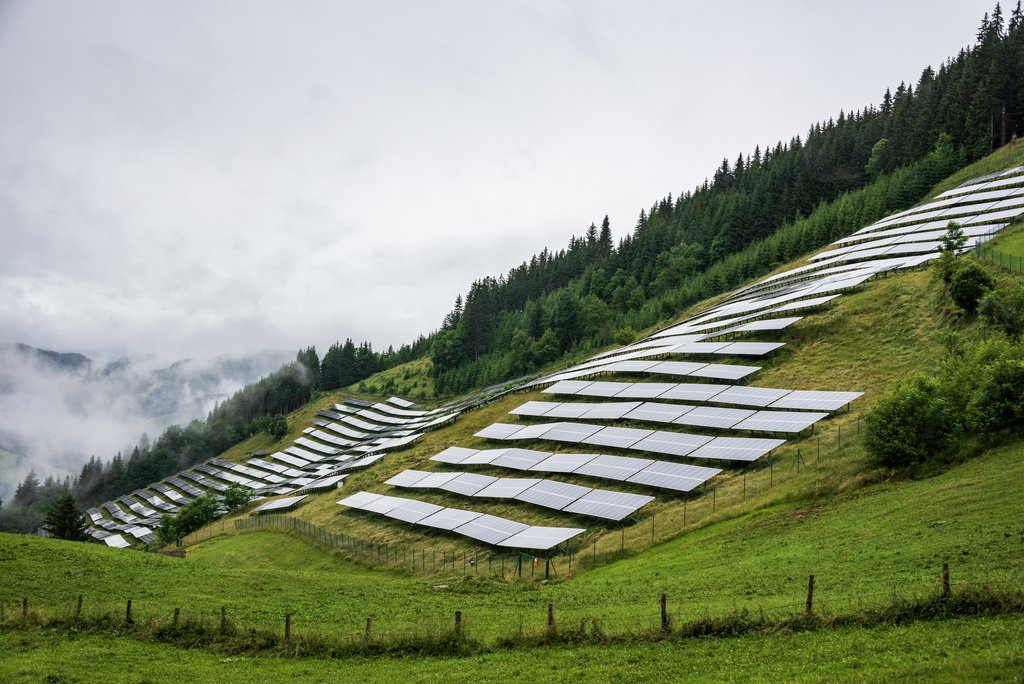Campus - 09.02.2023 - 11:28
HSG students design utopias for climate policy
How can the global community solve the "wicked problem" of climate change? HSG students have designed a wide variety of utopias to address this question. With this assignment, HSG lecturer and political scientist Adrian Rinscheid wants to promote creative patterns of thought among the students - and give them an optimistic perspective for their future work.
Source: HSG Newsroom

Solar, photovoltaic power station located on a mountain slope in the Alps. Foggy day, green pasture grass and blue skies and mountains create a fresh and ecological image.
Switzerland was the first country in the world to switch completely to renewable energies in 2050. This process was kicked off in 2025 by a series of political measures, including a ban on combustion engines, new oil and gas heating systems, and a massive expansion of Alpine solar installations. Among other things, climate-related natural disasters that hit various industrialised nations in 2023/24 contributed to these decisions by the Federal Council. These catastrophic years led to a political change of course worldwide and, therefore, to increased climate protection. The result: The world has reached the goal of becoming climate neutral in 2050, according to a report by the UN climate committee IPCC.
In the same year, news broke that McDonald's had lost 50 per cent of its global turnover in just two years. The reason for this is the company AllBugs, which offers healthy and sustainable fast food made from insects.
"Scenarios that are realistic from today's perspective".
HSG students designed utopias like this and others during the course "Energy and Climate Governance" in the autumn semester of last year. "The requirement for this task was that the utopias are realistic. That means they describe possible states that could occur based on the current levels of knowledge and technology," says HSG lecturer and political scientist Adrian Rinscheid. He teaches and conducts research at Radboud University in the Netherlands on energy and climate policy, as well as on the decision-making behaviour of political actors, and regularly takes on teaching assignments at the HSG.
To kick off the course, which was attended by HSG Master's students from a wide range of degree programmes, Rinscheid outlined the status quo of global climate policy in two lectures. "This overview is initially very sobering, as climate change is a highly complex and so-called 'wicked problem'." At the moment there are hardly any effective political solutions in sight, while at the same time humanity is under time pressure and players with the widest variety of different interests are involved in making numerous important decisions. Rinscheid: "With this course, I want to show the students that there are approaches to solving such problems."
Rinscheid also wants the young men and women to leave the course with an optimistic perspective. "Many of them will work in leading positions in business and society later on. It's therefore important that they believe they can make a difference."
During the course the students also worked in groups on topics such as international climate conferences, the area of tension between science and politics, climate protection in the transport and agricultural sectors, climate law, new technologies and the role of the financial sector.
Designing utopias promotes creativity
At the end of the course, students wrote essays about how the world might have evolved in terms of climate change by a time in the future that they chose themselves. For this purpose, the students had to select and link up at least three areas, such as jurisdiction, the financial sector and the agricultural industry.
"Thinking about the future trains the imagination. I also deliberately specified utopias rather than dystopias, as developing a positive perspective is more solution-oriented and, at the same time, much more challenging than simply thinking the current conditions through to the worst possible outcome," says Rinscheid. The design of a realistic utopia requires creative, unconventional, networked thinking. "In other words, patterns of thought that students also need in today's highly complex world of work in order to help shape its transformation in a sustainable way."